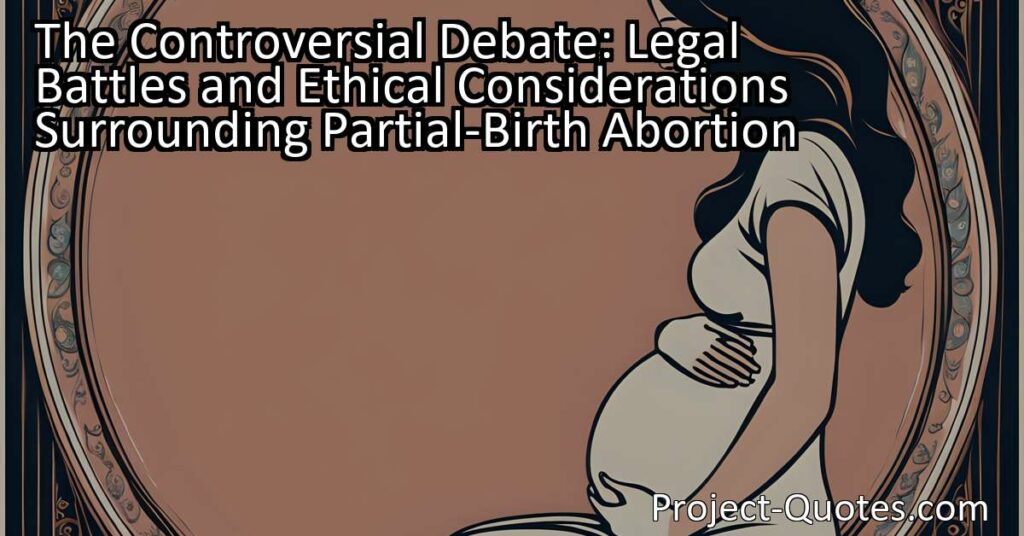Ban partial-birth abortion except to save mother’s life.
Jerry Weller
The controversial debate surrounding partial-birth abortion explores the ethical and medical implications of this procedure. Advocates argue for women’s autonomy and potential health risks, while opponents view it as inhumane and against the sanctity of life. Finding a balance between ethics and women’s health remains a complex challenge in this ongoing discussion.
Table of Contents
Meaning of Quote – Ban partial-birth abortion except to save mother’s life.
The Controversial Debate Surrounding Partial-Birth Abortion: Balancing Ethics and Women’s Health
Introduction :
Jerry Weller once stated, “Ban partial-birth abortion except to save a mother’s life.” This quote encapsulates a heated debate that has raged for decades, raising questions on the ethical and medical implications of this controversial procedure. In this discussion, we will delve into the concept of partial-birth abortion, exploring its definition, historical context, differing opinions, and the reasoning behind the call for restrictions on this procedure. We will also examine the complex intertwining factors of ethics and women’s health in this contentious issue.
1. Partial-Birth Abortion: Definition and Procedure :
Partial-birth abortion, medically referred to as intact dilation and extraction , is a late-term abortion procedure performed during the second or third trimester of pregnancy. This controversial method involves partially delivering the fetus, usually by feet-first breech, until only the head remains inside the birth canal. The doctor then punctures the base of the skull and extracts the fetal brain, collapsing the skull and facilitating the removal of the fetus from the birth canal.
2. Historical Context and Legal Battles :
Since its emergence in the early 1990s, partial-birth abortion has fueled passionate debates and legal battles across the United States. In 1995, the procedure became a focal point of national attention when President Bill Clinton vetoed a bill seeking to ban it. Subsequently, several states passed legislation outlawing partial-birth abortion, leading to legal battles that reached the Supreme Court.
However, in 2000, the Supreme Court ruled in Stenberg v. Carhart that Nebraska’s partial-birth abortion ban was unconstitutional. Eight years later, the Court reversed its decision in Gonzales v. Carhart, upholding the Partial-Birth Abortion Ban Act of 2003 at the federal level. Despite this ruling, the discussion surrounding the ethics and legality of partial-birth abortion continues to be a contentious issue.
3. Differing Perspectives: Ethical Considerations :
Opponents of partial-birth abortion argue that it constitutes a gruesome and inhumane procedure, as it involves destroying a developed fetus. They believe that the procedure is akin to infanticide and violates the sanctity of life. Some religious groups also condemn the procedure as against their core beliefs.
On the other hand, supporters of partial-birth abortion advocate for the right to choose, arguing that women should have the autonomy to make decisions about their reproductive health. They emphasize situations where the fetus has developed severe abnormalities or where the mother’s life is at risk due to complications during pregnancy. They argue that banning this procedure can endanger women’s health and may result in forcing them to endure grave risks or unwanted pregnancies.
4. Balancing Ethics and Women’s Health :
Balancing between ethical considerations and the health of the mother poses a significant challenge in the partial-birth abortion debate. The complexity arises when determining whether the need to protect the fetus outweighs the potential harm to the mother’s physical or mental health.
Some argue that health concerns must primarily focus on the mother’s immediate well-being and that placing the fetus’s life before the mother’s can be morally objectionable. They contend that potential harm to the mother, whether physical or mental, should be considered in the decision-making process.
Others maintain that the ethical duty to protect potential human life must be a fundamental consideration, even if it means potentially endangering the mother. They believe that the fetus’s right to life, combined with an obligation to prevent the intentional destruction of a viable human being, takes precedence over the mother’s right to choose.
Ultimately, any discussion surrounding partial-birth abortion should consider the broader context, including the availability of alternative options such as induced labor or cesarean section, which may provide a middle ground by prioritizing pregnant women’s health while acknowledging the ethical concerns surrounding late-term abortions.
Conclusion :
Jerry Weller’s quote highlights the ongoing debate surrounding partial-birth abortion and its intersection with ethics and women’s health. The competing perspectives, nuanced ethical considerations, and legal battles surrounding this procedure demonstrate the complexity of the issue, leaving society grappling with finding a balanced approach that respects both fetal life and women’s autonomy.
I hope this quote inspired image brings you hope and peace. Share it with someone who needs it today!


